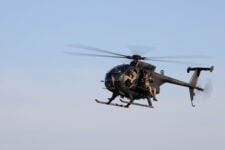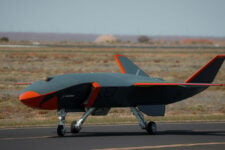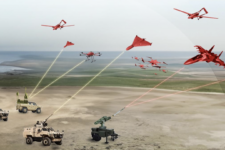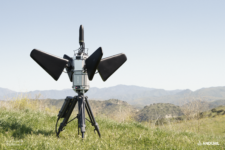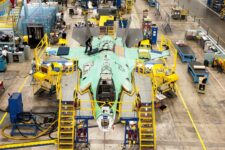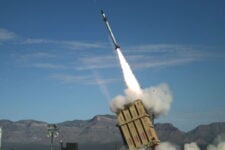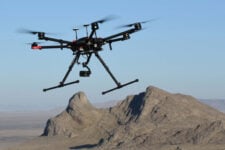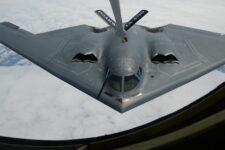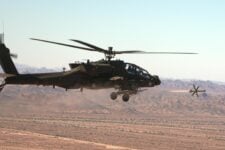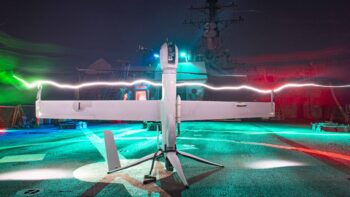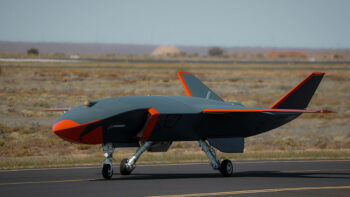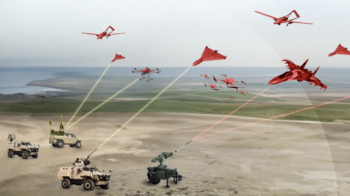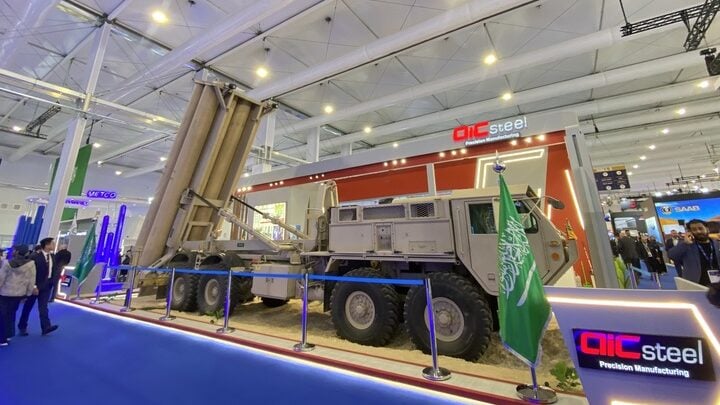
THAAD at AIC for Steel stand at World Defense Show 2024. (Agnes Helou / Breaking Defense)
WORLD DEFENSE SHOW 2024 — Lockheed Martin today awarded Terminal High Altitude Area Defense (THAAD) subcontracts to a pair of Saudi Arabian suppliers, paving the way for a first international customer to locally produce parts of the anti-ballistic missile system.
The contractors include Middle East Propulsion Company (MEPC), based in Riyadh, and Arabian International Company (AIC) for Steel, from Jeddah, with the contract awards aligned to “project approvals announced by the General Authority for Military Industries (GAMI)” in 2022. The agreements are designed to “localize the manufacture of THAAD interceptor canister and THAAD Missile Round Pallet in Saudi Arabia,” according to a Lockheed Martin statement.
The Missile Round Pallet, or transportable MRP-T production, will be undertaken by AIC for Steel, while MEPC will look after canister manufacturing. A complete THAAD platform was displayed at AIC’s stand at WDS 2024, while the canister was displayed at MEPC’s.
“There are currently only two production lines for these products: the original production line in the US, and now an additional source of supply here in the Kingdom,” Lockheed Martin’s vice president and general manager of Integrated Air and Missile Defense Jason Reynolds told Breaking Defense. “Lockheed Martin offered all the special tooling and test equipment, information, training, and technical assistance required for these products to be produced by Saudi industry to the same quality requirements we build to in the US.”
RELATED: State Department approves $5B in missile defense for UAE, Saudi Arabia
Although he didn’t specify the number of THAAD platforms to be produced in KSA, Reynolds assured that the quantity to be manufactured will be “substantial” and “will keep Saudi factories busy for many years.”
He added that Saudi firms are manufacturing subsystems and assembling the platforms.
“Our approach was to maximize the amount of Saudi content in the programs while ensuring we are able to meet challenging customer schedule requirements. Saudi industry is manufacturing piece parts, components, and assemblies,” Reynolds said.
The US State Department first cleared a Saudi THAAD deal, estimated at a cost of $15 billion, in 2017, covering the procurement of 44 launchers and 360 missiles, but the sites for the weapon system are not expected to be completed for at least another two years, according to Janes.
In April 2016, KSA launched its Vision 2030 initiative, aiming at technology transfer from international firms to the Kingdom and aiming to achieve 50 percent local production for defense platforms. This put the firms that have been exporting to the Kingdom for decades, like American ones, under greater commercial pressure to commit to higher levels of manufacturing parts abroad or that could conflict with domestic industrial base priorities at home.
Reynolds said that the firm’s strategy for localization is to identify and develop Saudi industrial parnters to manufacture, integrate, deliver and sustain defense equipment here in the Kingdom.
“We have some very exciting activities in development and execution as we speak that range from machining to the most high-tech activities like additive manufacturing and composites,” he added. “We are targeting technologies and opportunities that will both provide immediate impact to the Saudi industrial base and create opportunities for Saudi industry to compete within Lockheed Martin’s global supply chain for worldwide supply.”
THAAD has been designed to counter short-, medium- and long-range ballistic missiles. It was previously used in the Middle East by the United Arab Emirates to intercept Houthi militants’ Zulfiqar ballistic missiles, according to the British Royal United Services Institute defense think tank.
The US Air Force also announced deployment of a THAAD battery to the Middle East “region” in October 2023, as part of a wider move to increase force protection there.




